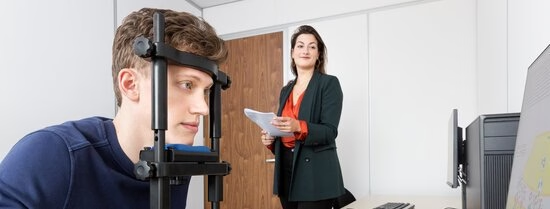Eyes - as mirrors of information
Eye movements are a source of information for researchers. Eye tracking is a method of measuring which gives insights into movements of the eye. Eye tracking shows how people gather information through their eyes and how this affects their actions and decisions.
A digital eye tracker makes it possible to determine what a user is looking at and for how long. The distance to the screen and the size of the user's pupil can also be recorded.
Eye tracking provides researchers with valuable information about learning processes (for example in educational research). The effect of an instruction on a student can be studied. Insight can be obtained into how experienced radiologists look at X-rays. Researchers in marketing use Eye tracking to study the attention and attention span of consumers for advertisements.
The Erasmus Behavioural Lab has two Tobii Pro Fusion eye trackers. The EBL also has an Eyelink 1000. This is an extremely accurate and precise eye tracker which is mainly used in reading research. Check out our lab specs for the options.
Tobii Eye-tracker specs:
- Records eye movements using cameras and infrared light with a frequency up to 250 Hz. Using improved eye tracking algorithms, movements can be recorded more accurately.
- Can report on pupil size data with the selected sampling frequency.
- Has a sampling frequency of 60 / 120 or 250 Hz, and an average viewing position error of 0.2°.
- The special Tobii Pro Lab eye-tracking software has a flexible platform which helps researchers create simple to complex experiments.
- For the highest sample frequency, it is possible to detect saccades.
Eyelink 1000 specs:
- Sample frequency up to 1000 Hz for binocular measurements and up to 2000 Hz for monocular measurements.
- Measurements with a special high-speed camera which enables detection of micro saccades.
- This eye tracker is ideal for advanced reading research.
